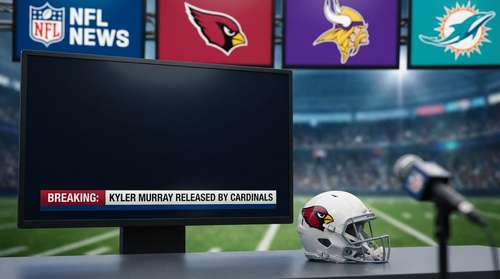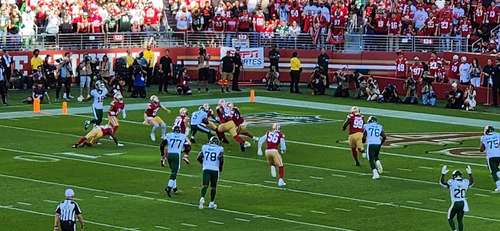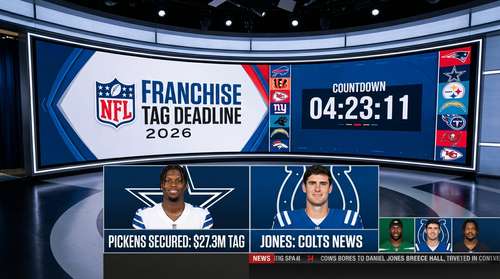In a season where every decision is under scrutiny, Buffalo Bills quarterback Josh Allen found himself in a heated moment over a play call that came in too late, costing the team a crucial fourth down. It’s never a good sign when your game strategy falls apart at the worst possible moment, and Allen’s frustration was palpable. Fans of the NFL and followers of the Bills are now asking: what went wrong, and how can the team better manage these critical decisions?
During the intense moments of the game, the offense was caught off guard by what many described as a delayed call. This wasn’t just a minor hiccup; it was a decision-making lapse that could change the outcome of a game. Allen’s reaction illustrated not only his personal frustration but also raised questions about the overall coaching decisions and game management within the team.
The Timing Issue: When Seconds Count
Timing is everything in football, and nowhere is this more apparent than during a fourth down. A late play call can turn a promising drive into a disappointing turnover, and that is exactly what happened on this occasion. The Bills, known for their aggressive play calling, seemed to have miscalculated the window of opportunity available.
The quarterback was left scrambling as the offense tried to decipher what was expected of them. With each tick of the clock, the pressure mounted, leaving little room for error. In this case, a more timely decision could have alleviated the mounting frustration, both on and off the field. This isn’t just about one play—it’s a reflection of the delicate nature of decision making in high-stakes moments.
Josh Allen’s body language throughout the incident spoke volumes. The quarterback, who is typically composed and confident, appeared visibly upset. It’s as if the frustration wasn’t solely reserved for the failed play, but also for an underlying issue with play calling and communication on the sidelines.
The Impact on Game Strategy and Momentum
A bad call on fourth down can have a ripple effect on the team’s momentum. When the play call comes late, it not only confuses the offense but also destabilizes the rhythm built up over the course of the game. This section digs into how one moment can shift the entire trajectory of game strategy.
Think about it: in football, every play is a piece of an intricate puzzle, requiring perfect coordination between the quarterback, receivers, and the coaching staff. A delayed play call disrupts that coordination, like a misfiring cogs in a well-oiled machine. It’s no wonder that when the Bills failed to capitalize on the fourth down, the frustration was evident both on the field and among fans following the unfolding drama.
The missed opportunity not only affected the score but also impacted the team’s defensive and offensive balance. The frustration echoed through the locker room and became a hot topic during post-game analyses. The essence of game strategy in the NFL is reliant on split-second decisions that are practiced and honed repeatedly through rigorous drills and teamwork.
Interestingly, this isn’t the first time the conversation around play calling has surfaced for the Bills. Questions about decision making and overall game management have been part of past game reviews, showing that even experienced veterans like Allen are not immune to the effects of compounded mistakes in real time.
Sideline Communication and the Role of Coaching Decisions
Communication between the sideline and the huddle is the lifeblood of any football team. Poor communication, as seen with the late play call, can lead to disjointed plays and missed opportunities. This section examines how coaching decisions on the sidelines impact the overall team performance, especially in high-pressure game scenarios.
One of the pressing concerns many hold is the efficiency of play calling by the offensive coordinator. In a fast-paced game, a delayed decision by the coach can create confusion among the players – a sentiment that was clearly evident when the play call on fourth down arrived too late.
It’s almost as if the play was a few beats off tempo. With coaches and players needing to be in sync, even a minor miscommunication at the heels of the fourth down can lead to an uncoordinated scramble. This scenario reminds fans that football is as much about mental agility and quick thinking as it is about athletic skill.
Even though coach Sean McDermott has reiterated his confidence in his staff, including the offensive coordinator, such incidents fuel speculation. When a pivotal moment such as a fourth-down play goes awry, it forces the entire team to reflect on whether timing or a lapse in communication was to blame.
For Josh Allen and the Bills, these types of frustrations underline the importance of tight-knit sideline strategies. The delayed play call serves as a reminder that in the realm of the NFL, split-second decisions can either be the spark for victory or the domino that leads to defeat.
Looking Ahead: Learning from the Frustration
Moving forward, the Bills must address the critical issues raised by the late play call. For a team operating at the top levels of the NFL, refining game strategy and enhancing sideline communication could be the difference between victory and a loss. With Josh Allen leading the charge, there’s potential for growth, but also a pressing need for clearer play calling and swift decision making.
Every great team faces growing pains, and moments like these are learning opportunities. It’s not uncommon for quarterbacks of Allen’s caliber to openly discuss play calling frustrations, as they understand the impact of timing on field performance. The conversation now turns to how the coaching staff can better manage these critical moments and ensure that every player is on the same page.
This incident might serve as a wake-up call for the Buffalo Bills. By addressing the underlying communication issues on the sidelines, the team can work towards a future where every play is executed with precision. Fans and analysts alike will be watching closely to see how the coaching staff adjusts their strategies to minimize miscommunications in future games.
In the end, the frustration felt by Josh Allen over the late play call isn’t a sign of weakness but rather a signal for necessary change. The feedback from the field can serve as valuable insight. For a franchise that aspires to remain at the forefront of NFL excellence, understanding and rectifying these flaws in game management is crucial.
For fans of the NFL and the Buffalo Bills, the takeaway is clear: in football, every decision counts, and even a momentary lapse can affect the outcome of a game. With the stakes this high, it’s imperative for the entire team to sync their efforts and avoid any delays that could jeopardize their success.
As we look ahead to the next game, all eyes will be on whether or not the coaching staff and team management can address these issues head-on. Future plays will no doubt be scrutinized to ensure that similar mistakes are not repeated. Josh Allen’s visible frustration has already set in motion a dialogue about the importance of timing, precision, and communication in NFL decision making.
By embracing these learning moments, the Bills can turn frustration into progress, paving the way for a more cohesive and resilient team dynamic. The challenge now is not just to win games, but to refine the art of play calling so that every fourth down is an opportunity seized rather than a mistake lamented.




